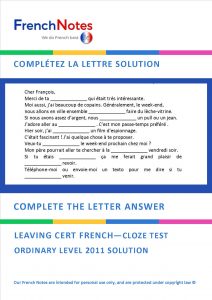
French Leaving Cert
French Leaving Cert
French Leaving Cert Ordinary Level Writing Task
Can you Fill in the Blanks?
Are you doing the French Leaving Cert ordinary level paper?
- Do you usually complete the filling in the blanks exercise? If you have been having difficulty with it, then we have the solution for you.
Fill In The Blanks Or Cloze Test
As I am sure many of my colleagues in teaching will agree, the vast majority of students who sit the ordinary level French paper for the leaving cert opt for the “Fill in the blanks” or “Cloze” test, which is usually the (a) option of Part A of the Expression Écrite. However, a lot of students rush through these and lose valuable marks along the way.
The filling in the blanks task is testing your ability to apply grammatical rules to a real-life situation (in this case, a postcard). It is a relatively easy writing task, but does require a bit of thinking on behalf of the student.
As a teacher you can save time on preparing these in advance of your class. The work is done for you. If you are a student taking French as an optional subject on your own at home, having the answers to check against will give you power over your learning. The great thing about these “Fill in the blanks” exercises is that they come up every single year!
In these sample or actual fill the gap exercises, I have provided the answers, but not just the answers. I have looked at the words preceding and following (where applicable) and explained why it must be the correct answer.
2006 Leaving Cert French Ordinary Paper
This example is taken from the 2006 Leaving Cert French Ordinary Paper.
This exercise is worth 30 marks. You are given a text, usually in the form of a letter, where you are presented with 10 words, which have to be filled into the text. Each word accounts for 3 marks. French Notes have filled in the blanks, and then explained the reason for the word used. We suggest that you try to complete the letter first, and then check your answers here.
LIST OF 10 WORDS GIVEN
- Grande
- Passe
- Sommes
- Banlieue
- à
- joli
- visité
- pas
- Chaque
- cartes
Bordeaux, le 5 juillet.
Chère Maman,
Je ____________ des vacances formidables à Bordeaux. La famille Legrand est très accueillante et nous avons déjà ____________ tout Bordeaux. C’est une ville magnifique. Leur maison se trouve en ____________ . Elle est assez ____________. Je partage la chambre de Nadine, c’est sympa. Avant-hier, nous ____________ allés à St Émilion où nous avons goûté à du vin rouge. Ça ne m’a ____________ beaucoup plu mais M. Legrand a acheté plusieurs bouteilles. Le village était très ____________ et j’ai envoyé des ____________ postales. Il fait chaud ____________ jour et Nadine m’a dit que nous irions bientôt ___________ la mer.
Écris-moi vite,
Bises.
Catherine.
Now before you scroll down, see if you can do it on your own!
Chère Maman,
Je passe des vacances formidables à Bordeaux. La famille Legrand est très accueillante et nous avons déjà visité tout Bordeaux. C’est une ville magnifique. La maison se trouve en banlieue. Elle est assez grande. Je partage la chambre de Nadine, c’est sympa. Avant-hier, nous sommes allés à St. Émilion où nous avons goûté du vin rouge. Ça ne m’a pas beaucoup plu mais M. Legrand a acheté plusieurs bouteilles. Le village était très joli et j’ai envoyé des cartes postales. Il fait chaud chaque jour et Nadine m’a dit que nous irions bientôt à la mer.
Écris-moi vite,
Bises.
Catherine.
| WORD
BEFORE |
WORD | WORD AFTER | REASONING |
| Je | passe | des
vacances |
In this type of blank, it is essential that you realise that it is a verb that you are looking for. Je meaning I is a subject pronoun and will always be followed by a verb. In the above text, you do not have a choice as passe is the 1st person singular of the verb passer – to spend. |
| nous avons déjà | visité | tout
Bordeaux |
Here, you are being tested on your knowledge of the passé composé. The passé compose is a compound past made up of either the present of the auxillary avoir or être + Past participle. A very easy rule to remember is that with avoir, there are generally three Past Participles
ER verbs go to é IR verbs go to i RE verbs go to u In the example given, visité is the only verb given ending in one of these three. |
| en | banlieue | En as a preposition never takes an article and generally means in the or made from. | |
| assez | grande | Grande is an adjective and in this example is describing the house. The word house in French, Maison is feminine so the adjective has to agree. Grande is the feminine form of the adjective grand meaning big. |
| WORD
BEFORE |
WORD | WORD AFTER | REASONING |
| nous | sommes | allés | Aller is one of the 16 verbs using être in the passé composé. Remember that whenever être is used in a sentence, everything has to agree. Nous sommes allé – add an s to the past participle allé as the sentence is masculine plural – We went. Remember that even if there are 5000 females going somewhere, and they are accompanied by 1 male, the sentence becomes masculine! |
| ne m’a | pas | beaucoup | The negative rule is easy to recognise, as ne or n’ always feature. Remember though that ne or n’ can be followed by several different endings. (see below) |
| le village était très | Joli | et | Joli is an adjective and in this example is describing the village. The word village in French, is masculine so the adjective has to agree. Joli is the masculine form of the adjective joli meaning pretty. |
| des | cartes | postales | cartes postales – postcards |
| chaud | chaque | jour | chaque = each quantifying word. Here you need to find a word which would go logically with the word day, jour. Chaque is logically correct. |
| bientôt | à | la mer | à – to (see below) |
LEAVING CERT FRENCH PLAN…
If you were to sign up for our Leaving Cert Annual Plan you would have access to..
- Over 500 sample topic sentences on a wide-range of topics
- Approximately 60 sample opinion pieces.
- Diary Entries
- Narrative writing technique & Phrases
- Grammar section
- Grammar exercises
- Reading comprehensions
- Verb drills
- Study guides
- Comprehensive oral section with videos
- Expressions & key constructions
- Letters and much more…

